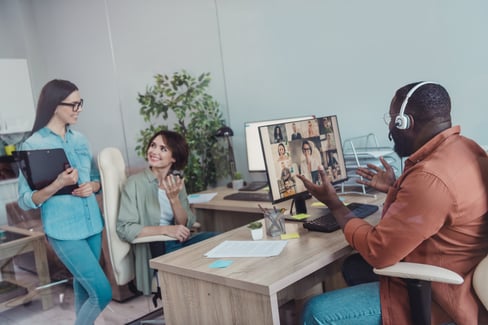Disconnect to Reconnect: The Benefits of Unplugging From Social Media

The average internet user spends nearly 2.5 hours each day on social media. While this can be a good way to stay in touch with friends and get information, it also has many negative impacts on a person's mental state. Reducing social media use is a good first step to a healthy mind and a healthier individual.
Here, we're going to look at some reasons you and your employees should try unplugging from social media. Read on to learn the benefits of disconnecting, how to unplug, and some alternative things to do instead of scrolling mindlessly.
Live in the Present
The first thing to tell employees that you hope will disconnect is that those who unplug become more able to live in the present.
This is especially true for those who are on social media waiting for work information and updates. Logging off means focusing on the present rather than stressing about tomorrow.
You'll have more chances to get in tune with your physical surroundings and senses. This is a grounding experience that allows you to practice mindfulness.
Removes Unhealthy and Unnecessary Feelings
Studies show that social media addiction can cause unnecessarily stressful and unpleasant emotions. In fact, one in three people feels worse after visiting Facebook. They become envious of others' seemingly-perfect lives and dissatisfied with their own, creating feelings of both jealousy and self-doubt.
Additionally, social media platforms give you political and social news that can put you in a bad mood. While keeping up-to-date is important, constantly being plugged into current events is stressful. It can generate feelings of hopelessness.
Confining social media use to certain hours gives you time to focus on the good in your own life. It's a time when users don't compare themselves to others or contextualize their lives in the context of devastating current events.
Discover New Hobbies
The average full-time employee works 8 hours a day. The average adult requires 8 hours of sleep each night. This leaves 8 hours to do everything else including eating, commuting, and in some cases overtime.
When you waste 2.5 hours on social media, you greatly cut into your limited free time. It's better to use this time to improve your own life.
Take up a hobby like knitting or spin classes. Try sketching or sculpting. Discover new interests and read books about history or romance.
The possibilities are wide open for those that unplug.
Improve Sleep
The negative feelings that social media often generates negatively impact sleep. After all, no one gets a good night's rest when they're stressed out. However, this is not the only way that social media addiction can hinder sleep.
Screens give off blue light that stimulates the brain. Studies show that this can make us feel alert and keep us awake, which is counterintuitive when trying to wind down for bed. Unplugging for a few hours before bedtime is a great way to ensure that you get sound and restful sleep each night.
Get Outdoor Time
When people sit there and endlessly scroll through social media, they're unlikely to make time for outdoor activities. Unfortunately, getting Vitamin D and exercise are an integral part of any wellness strategy.
Take the time you would spend on social media and walk around your local park. Take a jog or engage in outdoor sports. This will get you active so that you can boost both your mental and physical well-being.
How to Help Employees Disconnect
As a wellness provider or HR professional, it's important that you provide employees and colleagues with ways to easily unplug from the web. Work with management professionals to create hard end times for the workday and discourage social media use after that time. During these hours, make sure that employees do not get notifications for work calls, texts, or emails.
If you cannot create hard workday end times because you work in an industry such as health care or security, you can schedule specific periods of the day to help employees unplug. Do not send certain people notifications at designated times of the day. Others should be on call during those hours when needed.
The bottom line is that workers should have the right to disconnect from work-related messages during non-work hours. They only need to be plugged in when they are being paid for it.
It's critical that these ideas are ingrained within the workplace culture. Sharing these ideas lets employees know that they will not miss anything or be penalized for unplugging - in fact, they will understand that it is encouraged. Emphasizing the value of their mental health also is a surefire way to make them feel valued.
Alternatives to Using Social Media 24/7
When you're fostering a work environment that values unplugging, it's also important to give employees some alternative activities to mindless scrolling. Some ideas include:
- Reading a good book
- Keeping a journal
- Trying out new arts and crafts (scrapbooking, crochet, sketching)
- Learning a musical instrument
- Listening to music
- Doing stretches and yoga
- Meditation
- Light exercises like jogging
- Calling a friend or family member to connect in a more meaningful way than they would on social media
Emphasize that it's especially important to try these other activities before bedtime. This promotes better sleep hygiene so that they can come to work refreshed the next day.
Start Unplugging from Social Media and Living Life to the Fullest
Now that you know some benefits of unplugging from social media, it's time to learn more information to bolster your quality of life. CoreHealth is committed to corporate wellness and to helping human resources and wellness professionals boost employees' well-being.
Contact us to talk about how we can best help you foster an environment of mental and physical wellness in the workplace.
About The Author
CoreHealth Marketing
CoreHealth Technologies Inc. is a total well-being technology company trusted by global providers to power their health and wellness programs. Our wellness portals help maximize health, engagement, and productivity for 3+ million employees worldwide.

